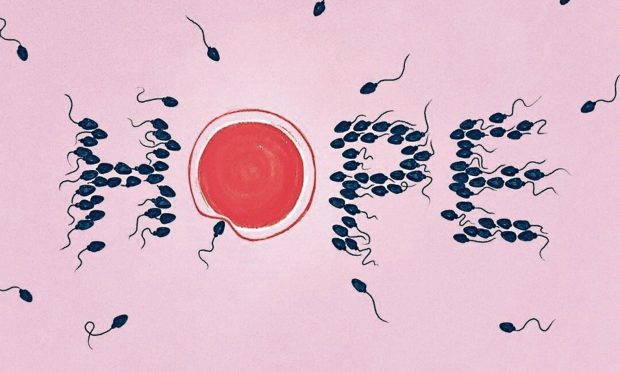
Women’s rights champions have raised concerns about the Scottish Government’s campaign to encourage egg donation, describing it as “like something out of The Handmaid’s Tale”.
They accuse the government of targeting vulnerable young women with emotive advertising focusing on “hope”, “joy” and “love”.
But they warn none of the potentially deadly side effects appear on the colourful advertising campaign, despite two women having lost their lives as a result of the complex medical procedures required to harvest their eggs.
Helen Gibson, of Surrogacy Concern, said: “We are deeply concerned the Scottish Government is the only government in the world actively recruiting female egg donors. It feels like something out of Margaret Atwood’s disturbing dystopian novel The Handmaid’s Tale.
“However, the potentially fatal side effects of egg harvesting are not mentioned anywhere near their ads which use emotive language to persuade donors they are giving gifts of hope, joy and love.
“We see this as preying on vulnerable young women, before they have even had an opportunity to have children themselves.
“Who knows what their future holds? Something may happen and they can’t have children later, leaving them with a lifetime of regret. We’re convinced the Scottish Government took this step because they agreed to same-sex NHS IVF in 2017, and there’s a shortage of egg donors for male couples.”
Concern has been raised that the £750 expenses paid by private fertility clinics could be a “draw” for desperate young women.
Gibson said: “Women with money worries, or students desperate to rid themselves of years of debt, could be drawn by those expenses. The whole scenario leaves a very bad taste.”
Gibson’s concern escalated when the Scottish Government admitted it had not commissioned any research on the safety of egg donation to deliver its programme.
She said: “That is unacceptable. The government is asking women to donate their eggs as if it was a commodity to be plundered, when it hasn’t even done its own research to ensure the process is safe. The state created an artificial demand for eggs, as if it is a public resource. And, after offering IVF to same-sex couples, now, of course, there is a shortage of eggs.
“They are targeting impressionable teenagers preying on their emotions to ‘be kind’ and give others the ‘joy’ of becoming a parent.”
Young women under 30 are likely to be most at risk of hyperstimulation of their ovaries during the egg harvesting process, a condition that can have fatal side effects. Gibson said: “Two women died in England in 2005 and 2006 as a result of this process, but there are no warnings about that or other side effects such as bowel perforation, abscesses, or sepsis.”
Ovarian hyperstimulation syndrome (OHSS) occurs when ovaries develop too many follicles as they over-respond to the medication used to mature eggs prior to retrieval. Fluid from the blood vessels leaks into the abdomen and, in some cases, into the space around the heart and lungs.
Gibson said: “Severe OHSS is rare, but the two deaths we know about show it does happen.
“Drugs used to suppress a woman’s menstrual cycle and mature eggs can raise cancer risks.
“We’ve seen evidence of a surrogate mother and egg donor electing to have her fallopian tubes removed to reduce the risk of cancer following egg retrieval.”
Julie McGhee, of the Scottish Women’s Coalition On Surrogacy, said there were also concerns over the Law Commission of Scotland’s draft Surrogacy Bill, which wants to end the parental rights of a mother when she gives birth. She said: “These moves are akin to turning a woman’s body into a production line. They are based on the misconception that the mother is a passive, impersonal and interchangeable incubator. In fact, it is modern-day slavery.
“Proposed changes in the law want to strip mothers of parental rights almost as soon as she gives birth, giving legal status instead to the ‘new’ parents. This is inhumane and incompatible with human rights in the same way countries all over the world recognise the sale of a kidney to be.
“Surrogacy is romanticised as a fairytale with happy endings when it goes against all evidence of what children need.
“Safeguarding measures present in adoption are absent in surrogacy. Anyone with enough money can buy a baby and, in many developing countries, the costs are not prohibitive.”
The Scottish Government said: “The campaigns invite altruistic donations made through a desire to support those who need help becoming parents.
“NHS Scotland do not make payments or provide compensation to gamete donors. All potential NHS gamete donors are advised of the procedure used to collect gametes, receive free mandatory counselling, and are given sufficient, accessible and up-to-date information to enable them to make informed decisions about any consent they then provide.
“NHS IVF treatment in Scotland is available to all eligible couples who meet the access criteria. This includes same sex couples.
“NHS Scotland is not involved in identifying a surrogate or financial or legal arrangements made between the surrogate and the couple.”

Enjoy the convenience of having The Sunday Post delivered as a digital ePaper straight to your smartphone, tablet or computer.
Subscribe for only £5.49 a month and enjoy all the benefits of the printed paper as a digital replica.
Subscribe